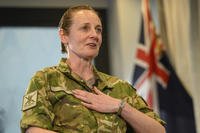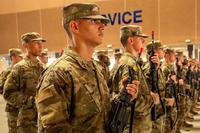A new report revealing more than $84 million in underpayments to qualified veterans is a sign the Department of Veterans Affairs needs to improve its training for employees. That's the conclusion of a congressional committee looking into the massive error.
And, veterans' advocates say, the error is also a reminder of the importance of nonprofit legal clinics specializing in the needs of veterans. Those cases can be complicated due to government regulations and legal technicalities.
The report, issued last month, found that "claims processors did not consistently follow policies and procedures when processing these claims, resulting in at least $100 million in improper payments (underpayments and overpayments) to veterans from May 1, 2022, to April 30, 2023."
Of that $100 million, about $85 million should have been paid to veterans rated as 100% disabled.
During a recent hearing before the House Subcommittee on Disability Assistance and Memorial Affairs, Rep. Chris Pappas (D-N.H.) attributed part of the problem to the "success of the PACT Act," a new federal law that expands VA health care and benefits for veterans who were exposed to toxic substances during their military service.
As a result, Pappas said, there has been a surge in claims to the Veterans Benefits Administration.
"And to respond to that demand, they've hired and onboarded thousands of claims processors seemingly overnight. Even the most robust operation would be strained, but all systems must be continuously reevaluated. VBA employees face tremendous challenges in processing complex disability claims. These challenges are only exacerbated by changing policies and processes that are disconnected from the workforce."
Any American who has had an issue with the Social Security Administration or even their local DMV knows it's not uncommon to get tripped up by bureaucracy. But for veterans, particularly disabled veterans, the consequences can be serious.
That's one reason veterans advocates have opened free legal clinics for veterans, like the ones wrongfully denied these claims, to help them appeal these decisions and get the benefits they need. And while Pappas may be right that the PACT Act has exacerbated the problem, it's not a new one, says Judy Clausen, supervising attorney for the nonprofit Veterans and Servicemembers Legal Clinic at the University of Florida.
"We've had clients who have gotten decisions from the VA that made no sense at all," Clausen told InsideSources. "But if [the veteran] doesn't have representation, they won't know they've been given a ridiculous response to their claim."
Clausen is quick to point out the VA works hard to serve veterans, but given there are 16 million veterans in the U.S. -- more than 5 million with service-connected disabilities -- there are always going to be issues. (Pennsylvania is home to about 800,000 veterans, the fourth-largest population in the country.)
"And veteran's benefits is a very technical area of the law. It's often compared to tax law. It's a niche area, and it often interweaves complex medical issues," Clausen said. "I know attorneys who deal with Social Security benefits who won't take it on without additional training."
University of Florida law students get that training at the Veterans and Servicemembers Legal Clinic, where they learn how to represent veterans in appeals to the U.S. Court of Appeals for veterans claims and discharge upgrades. And because they receive funding from sponsors like Philip Morris International, their services come at no cost to the veterans.
"We use grants to hire doctors, for example, to get the details veterans need for complex medical claims, so it's free."
In Pappas' home state, a group called 603 Legal Aid has started the "Hope for Heroes" initiative and is currently training its staff to be able to provide services to veterans.
"Navigating the complexities of the VA's rules and regulations can be overwhelming, especially for those who have served our country and now find themselves facing legal challenges like eviction, foreclosure, or a wrongful denial of benefits," said 603 Legal Aid Executive Director Ariel Clemmer.
Meanwhile, the $100 million problem remains.
Ronald Burke Jr., the deputy undersecretary for policy and oversight at VBA, told the subcommittee his agency has "taken corrective action on 95 percent of the cases identified in that report," and promised to address the remainder.
Another issue, according to subcommittee chair Rep. Morgan Luttrell (R-Texas), is forcing veterans to take unnecessary disability compensation exams. "A March 2023 report found 44 percent of disability compensation exams were unnecessary," he told Burke. "What's the VA doing to reduce these for veterans?"
Burke again said the VBA was aware of the problem and was already implementing solutions, but he couldn't guarantee it would be solved entirely.
Examples like that, Clausen argues, is the reason clinics like hers are necessary. When there's a conflict between the bureaucratic demands and the realities facing disabled veterans, it can often take an attorney to resolve them.
"We have a client right now who is dying of Parkinson's Disease as a result of his exposure to Agent Orange. He missed the presumptive period by just four months. In other words, if his service had begun just four months earlier, he would have been automatically included [in the benefits coverage].
"It's been so infuriating. Our doctor says he got it from the soil. Their doctor says he got it from the soil. But a VA official raised questions, and now we're being forced to fight for survivor benefits for his family."
And, she added, it's unlikely a for-profit law firm would take the case.
"Without patience and persistence, this wouldn't get resolved. At clinics like ours, we don't have a for-profit model. Our students are enthusiastic and motivated. Private lawyers are fine. They do good work. But we can stay in as long as it takes to get these veterans what they deserve," Clausen said.
(c) 2024 Delaware Valley Journal, West Chester, Pa.
Visit Delaware Valley Journal, West Chester, Pa. at https://delawarevalleyjournal.com/
Distributed by Tribune Content Agency, LLC.











